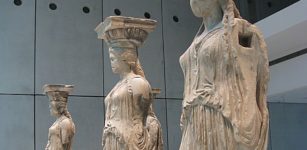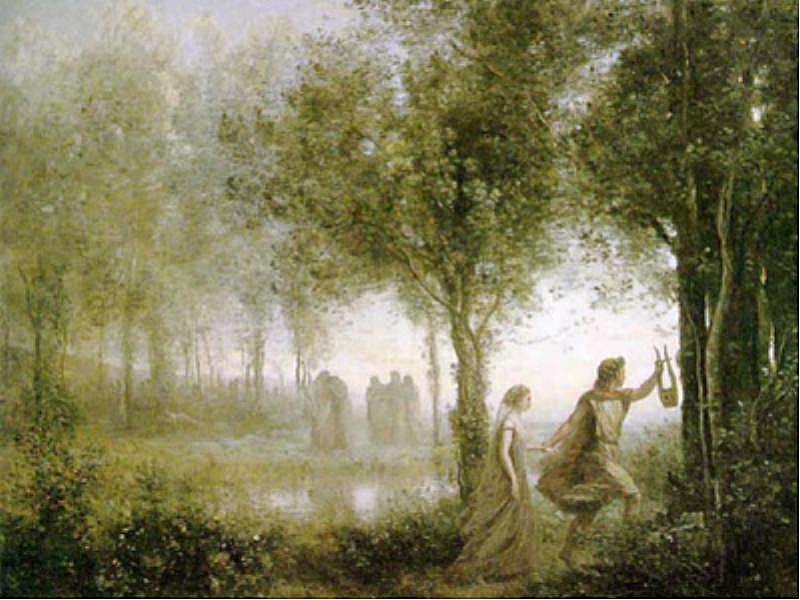Descent Of Orpheus To Underworld Ruled By Hades
A. Sutherland - AncientPages.com - The myth of Orpheus is an attempt to bring the dead to the living world. The death, and its inevitable coming have always caused fear but through the ages people have successfully managed to reduce this negative feeling.
Orpheus was a son of the Thracian river god Oiagros and the Muse Calliope. He was born in a cave not far from Mount Olympus. He was a legendary Thracian musician, poet, and prophet in ancient Greek religion and myth. He sang and played on the lyre so beautifully that everything that lived was gathered around him to listen to his songs and playing.
Mentioned in many Greek stories, he is particularly well-remembered as the harpist and companion of Jason and the Argonauts, who went on an expedition to find for the Golden Fleece.
His rhythmic music made their sailing easier and saved the Argonauts, when they approached the island of the Sirens, sea-nymphs who were endowed with such wonderful voices, that their sweet songs are said to have lured sailors to destruction.
Orpheus was one of the few Greek heroes, who visited the Underworld and successfully returned.
See also:
Goddesses Of Fate And Destiny In Greek, Roman And Slavic Mythology
Goddess Artemis – One Of The Most Respected Olympians
Not many people managed to visit the domain of Hades, but Orpheus was one of them who defeated death, descended to the underground kingdom and left it alive.
Probably the most famous Orpheus myth is the one describing him and his lovely bride Eurydice ("she whose justice extends widely"). They had not been long married when she stepped on a poisonous snake, whose venom killed her. Determined to have her brought back to life, Orpheus traveled to the underworld carrying only his lyre; he hoped to plead with Hades for Eurydice ’release.
He met Hades and explained that he was determined not to leave the land of the dead without his beloved wife. He sang for him beautiful songs, which once again did not lose their power. Surprisingly, Hades agreed to release Eurydice on one condition that he should walk in front of her and not look back until they both had left the underworld.
They followed the dark path and Orpheus guided his wife by striking notes on his lyre but suddenly at last moment of their journey, he suddenly turned to look at her and she vanished from his sight forever. It was the first and Orpheus was not allowed into the underworld anymore.
Angry and distraught at the loss, he returned to Thrace where he came in conflict with the Maenads, female followers of Dionysus, the god of the grape harvest, winemaking and wine.
In one of their bizarre orgies, the Maenads attacked Orpheus and tore him to pieces and then threw his head into the river Hebrus.
His head and lyre were floating on the water and amazingly, sad songs were heard all the way to the Mediterranean Sea. Then they reached the island of Lesbos, where the inhabitants finally buried his head and a shrine was built in Orpheus’ honor near Antissa. All who visited the cave could consult his oracle, until it was ceased by Apollo.
His magical lyre was carried to heaven and placed among the stars by the Muses, who also gathered up the pieces of his body and buried them at Leibethra near Mount Olympus: his grave was always accompanied by the nightingales singing their eternal song.
Orpheus’ soul returned to the underworld and, thus, he could reunite with his wife Eurydice, forever.
Written by – A. Sutherland - AncientPages.com Senior Staff Writer
Copyright © AncientPages.com All rights reserved. This material may not be published, broadcast, rewritten or redistributed in whole or part without the express written permission of AncientPages.com
Expand for references
More From Ancient Pages
-
 Radiocarbon Dating Sheds Light On Historical Events In The Ancient City Of Gezer
Archaeology | Nov 15, 2023
Radiocarbon Dating Sheds Light On Historical Events In The Ancient City Of Gezer
Archaeology | Nov 15, 2023 -
 “Hittite Forest” That Grew 4,500 Years Ago Will Be Created In Alacahöyük, Turkey
Archaeology | Dec 21, 2015
“Hittite Forest” That Grew 4,500 Years Ago Will Be Created In Alacahöyük, Turkey
Archaeology | Dec 21, 2015 -
 Aboriginal Art And Knowledge Unlocks Mystery Of Fairy Circles
Archaeology | Apr 5, 2023
Aboriginal Art And Knowledge Unlocks Mystery Of Fairy Circles
Archaeology | Apr 5, 2023 -
 Men Are Slowly Losing Their Y Chromosome – Is The Future Of Humanity In Danger?
Featured Stories | Nov 7, 2023
Men Are Slowly Losing Their Y Chromosome – Is The Future Of Humanity In Danger?
Featured Stories | Nov 7, 2023 -
 Ancient Ruins Of Quilmes: Largest Pre-Colombian Settlement In Argentina
Featured Stories | Mar 28, 2019
Ancient Ruins Of Quilmes: Largest Pre-Colombian Settlement In Argentina
Featured Stories | Mar 28, 2019 -
 Mystery Greek tomb was dedicated to companion of Alexander – experts say
Civilizations | Oct 1, 2015
Mystery Greek tomb was dedicated to companion of Alexander – experts say
Civilizations | Oct 1, 2015 -
 Rosicrucians’ Secret Knowledge Of Atlantis, Pyramids And Extraterrestrial Visitations
Ancient Mysteries | Apr 17, 2017
Rosicrucians’ Secret Knowledge Of Atlantis, Pyramids And Extraterrestrial Visitations
Ancient Mysteries | Apr 17, 2017 -
 On This Day In History: Albertus Magnus – Medieval Person Of Great Historical Importance Died – On Nov 15, 1280
News | Nov 15, 2016
On This Day In History: Albertus Magnus – Medieval Person Of Great Historical Importance Died – On Nov 15, 1280
News | Nov 15, 2016 -
 Early Harappan Cultures Can Solve Mysteries Of Several Lost Cities Of Indus Valley Civilization
Artifacts | May 30, 2019
Early Harappan Cultures Can Solve Mysteries Of Several Lost Cities Of Indus Valley Civilization
Artifacts | May 30, 2019 -
 ‘Homo Erectus’ From Gongwangling Could Have Been One Of The First Human Beings 1,6 Million Years Ago
Archaeology | Jun 14, 2022
‘Homo Erectus’ From Gongwangling Could Have Been One Of The First Human Beings 1,6 Million Years Ago
Archaeology | Jun 14, 2022 -
 Never-Before-Seen Structures Of King Herod’s Magnificent Palace Herodium Unveiled
Archaeology | Dec 11, 2020
Never-Before-Seen Structures Of King Herod’s Magnificent Palace Herodium Unveiled
Archaeology | Dec 11, 2020 -
 Stunning Well-Preserved Larger Than Life Statue Of Hercules Discovered In Philippi, Greece
Archaeology | Sep 24, 2022
Stunning Well-Preserved Larger Than Life Statue Of Hercules Discovered In Philippi, Greece
Archaeology | Sep 24, 2022 -
 Unorthodox Ancient ‘Out-Of-This World’ Carvings Were Found And Destroyed – Discovery – Part 1
Ancient Mysteries | Aug 10, 2020
Unorthodox Ancient ‘Out-Of-This World’ Carvings Were Found And Destroyed – Discovery – Part 1
Ancient Mysteries | Aug 10, 2020 -
 On This Day In History: Battle Of Lihula Between Swedish And Estonian Armies Was Fought – On August 8, 1220
News | Aug 8, 2016
On This Day In History: Battle Of Lihula Between Swedish And Estonian Armies Was Fought – On August 8, 1220
News | Aug 8, 2016 -
 Early Humans In The Paleolithic Age Had A More Varied Diet Than Previously Assumed
Archaeology | Nov 29, 2023
Early Humans In The Paleolithic Age Had A More Varied Diet Than Previously Assumed
Archaeology | Nov 29, 2023 -
 Clapping To Show Appreciation Is An Ancient And Widespread Behavior
Ancient History Facts | May 16, 2016
Clapping To Show Appreciation Is An Ancient And Widespread Behavior
Ancient History Facts | May 16, 2016 -
 Mysterious Ancient Maya ‘Star War’ Glyph And Its Possible Connection To Venus
Archaeoastronomy | Feb 20, 2019
Mysterious Ancient Maya ‘Star War’ Glyph And Its Possible Connection To Venus
Archaeoastronomy | Feb 20, 2019 -
 The Parthenon Marbles Evoke Particularly Fierce Repatriation Debates – An Archaeologist Explains Why
Artifacts | Jul 1, 2024
The Parthenon Marbles Evoke Particularly Fierce Repatriation Debates – An Archaeologist Explains Why
Artifacts | Jul 1, 2024 -
 Huge Ancient Underground Stone Circle Discovered Inside Cornwall Neolithic Henge
Archaeology | May 21, 2022
Huge Ancient Underground Stone Circle Discovered Inside Cornwall Neolithic Henge
Archaeology | May 21, 2022 -
 Ancient European Buildings Form A Sacred Symbol When Viewed From The Air – Scientist Reveals
Ancient Mysteries | Jun 15, 2018
Ancient European Buildings Form A Sacred Symbol When Viewed From The Air – Scientist Reveals
Ancient Mysteries | Jun 15, 2018


